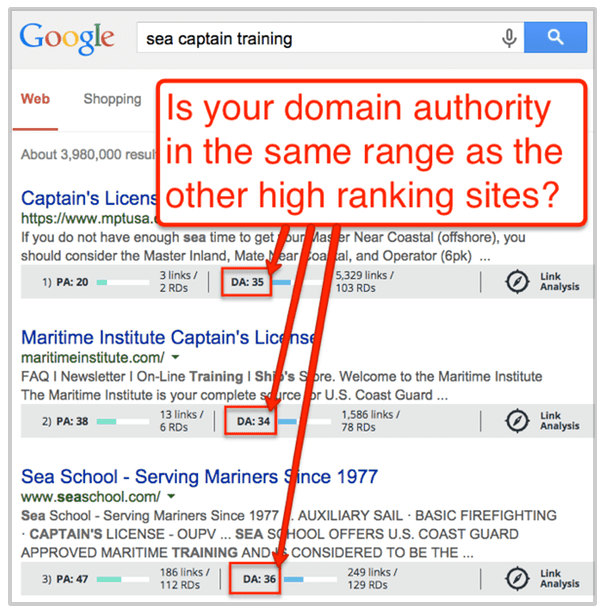This post is a quick roundup of some of the worst SEO mistakes we’ve seen. These are the little things that can sink the ship, pulling you down in search engines, down to the abyss of SEO irrelevance.
1. Keyword Stuffing
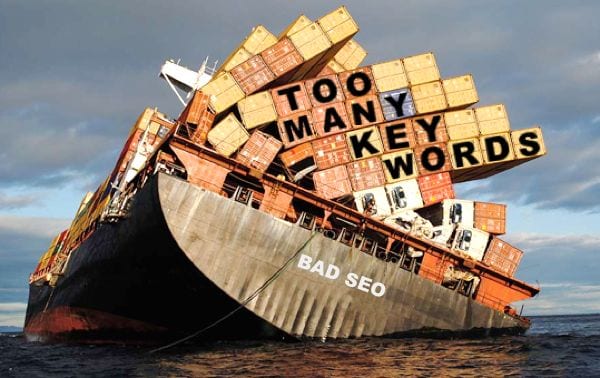
The problem with keyword stuffing is that keyword stuffing is very obvious to search engines, which notice keyword stuffing very easily and can penalize web pages stuffed with keywords.
Keyword stuffing and keyphrase stuffing is also bad for visitors, who may read a page stuffed with keywords and think it’s strange that the webpage has so many of the same keywords.
So stuffing and filling pages with keywords and keyphrases is bad for search engine optimization (SEO) and for visitors.
2. Targeting Phrases No One Is Searching For
Ranking for a phrase that doesn’t bring in traffic might feel good, but really it’s just vanity.
Enter the possible keyphrase into the Google Keyword Planner. If you see a dashed line, rather than a number, then the phrase was searched for fewer than 10 times per month on average over the last 12 months.
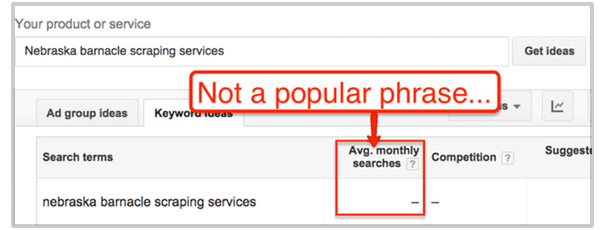
This doesn’t actually mean zero, it just means very low. If there is other evidence that there is demand for the topic (for example, Google suggests the phrase when you type related phrases into the search box) then it still might be worth targeting.
The Fix:
Target phrases when you have some indication that people are searching for them, either because they have more than “-” searches according to the Keyword Planner or they are suggested search phrases in Google.
3. Removing Your Own Site From Google
What’s the opposite of search friendly? Search rude. Here’s how to be rude to Google and tell them to ignore your website.
This is a surefire way to sink your own site.
There’s a venue here in Chicago that books all kinds of shows. People love it. But ask Google for showtimes and you get this…
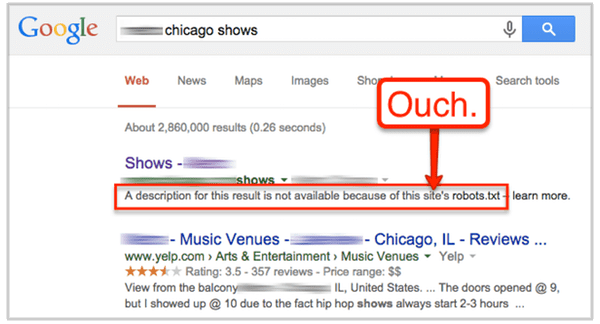
That’s right. This is what that little message says…
A description for this result is not available because of this site’s robots.txt
The robots.txt file is just a place to talk to search engines. Every site has one (or should). To see yours, just go to www.YourWebsite.com/robots.txt. While you’re there, make sure it doesn’t look like this.
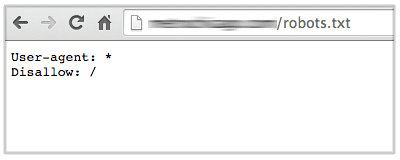
This file is telling every search engine (User-agent: *) to ignore everything (Disallow: /).
That’s bad.
This is an especially big SEO mistake because Google is now so good at helping people find showtimes. This is what it could look like.
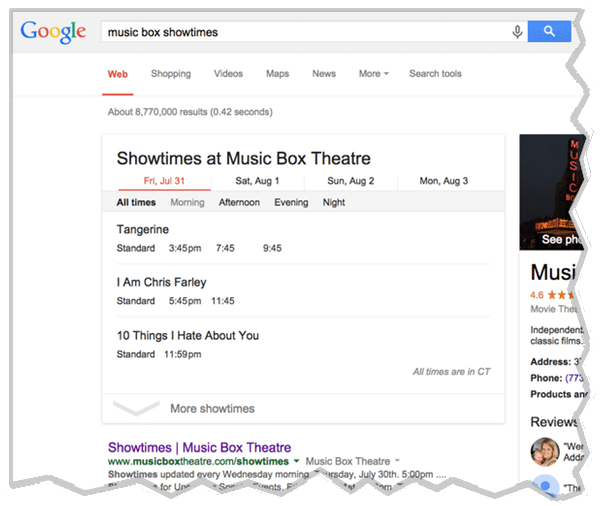
Nice, right? A beautiful, simple way to help your audience find out what’s showing.
Actually, the biggest SEO mistake also appears in robots.txt files: “noindex.” This will completely remove your site from Google. You won’t show up at all.
This could be useful to add to an extranet or a login area. But generally, you don’t want to torpedo a marketing website.
The Fix:
Make sure your robots.txt file allows Google to properly crawl and index your website. Let’s move on to the next potential disaster. This common mistake is also about managing appearances in search results.
4. Targeting Phrases That Are Too Competitive
This is a more common SEO mistake: targeting the super popular phrase that you don’t have a chance for. When does it make sense to target a low-volume phrase? When the more popular phrases are too competitive.
Here’s what most people don’t understand about search engine optimization: If the other high-ranking web pages for the target keyphrase are much more authoritative than yours, you don’t have a chance of ranking.
Target a keyphrase only if your authority in the same range as the authority of the high-ranking websites.
- How can you check your own authority? Use Open Site Explorer.
- How can you check the authority of the high-ranking sites for the phrase? Install MozBar (a Chrome extension). Turn it on and search for the phrase.
The Fix:
Pick your battles. Every phrase is a different competitive set. Some topics are extremely competitive (and worth millions of dollars) and others are relatively simple to rank for, taking little effort.
Generic Home Page Title Tag
The title tag of your home page is the single most important piece of SEO real estate on your website. If your website were a book, this would be the text on the cover.
It’s important not just for ranking high, but for getting clicks if you do rank. It affects click through rates because it often appears as the link in Google search results.
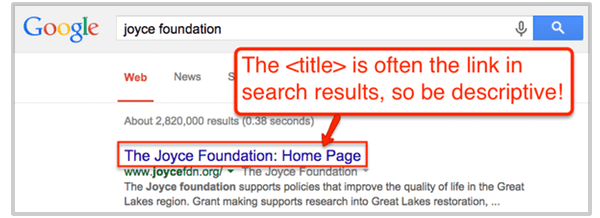
The all time worst home page title tag? You guessed it… “home”
Why? It says nothing about what you do. It doesn’t help you rank or communicate with potential visitors.
The Fix:
Write a title that tells Google and people what you do. Here are some quick guidelines.
- Include a keyphrase for the main category for your type of business
- Include the company name at the end, after the keyphrase
- Is no more than 55 characters (if it’s longer, it will get truncated)
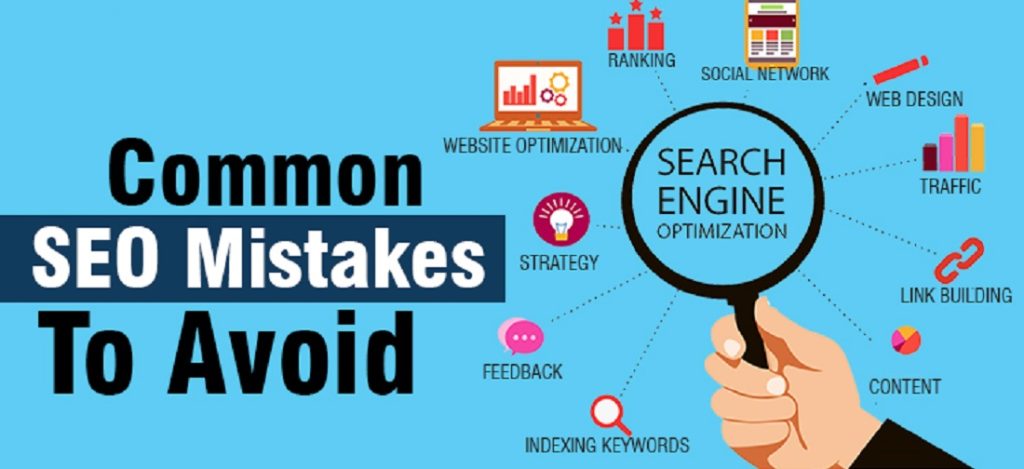
On the other hand, The list of common SEO mistake you should avoid
- Using a single title across all of your site’s pages or a large group of pages
- Using extremely lengthy titles that are unhelpful to users.
- Stuffing unneeded keywords in your title tags.
- Using a single description meta tag across all of your site’s pages or a large group of pages
- Placing text in heading tags that wouldn’t be helpful in defining the structure of the page.
- Using heading tags where other tags like and may be more appropriate.
- Erratically moving from one heading tag size to another.
- Excessive use of heading tags on a page.
- Very long headings.
- Using heading tags only for styling text and not presenting structure.
- Using invalid markup
- Changing the source code of your site when you are unsure about implementing markup
- Adding markup data which is not visible to users.
- Creating fake reviews or adding irrelevant markups.
- Creating complex webs of navigation links, for example, linking every page on your site to every other page.
- Going overboard with slicing and dicing your content (so that it takes twenty clicks to reach from the homepage).
- Having a navigation based entirely on images, or animations.
- Requiring script or plugin-based event-handling for navigation
- Letting your navigational page become out of date with broken links.
- Creating a navigational page that simply lists pages without organizing them, for example by subject.
- Allowing your 404 pages to be indexed in search engines (make sure that your web server is configured to give a 404 HTTP status code or – in the case of JavaScript-based sites – include a noindex robots meta-tag when non-existent pages are requested).
- Blocking 404 pages from being crawled through the robots.txt file.
- Providing only a vague message like “Not found”, “404”, or no 404 page at all.
- Using a design for your 404 pages that isn’t consistent with the rest of your site.
- Using lengthy URLs with unnecessary parameters and session IDs.
- Choosing generic page names like “page1.html”.
- Using excessive keywords like “baseball-cards-baseball-cards-baseballcards.htm”.
- Having deep nesting of subdirectories like “…/dir1/dir2/dir3/dir4/dir5/dir6/page.html”.
- Using directory names that have no relation to the content in them.
- Having pages from subdomains and the root directory access the same content, for example, “domain.com/page.html” and “sub.domain.com/page.html”
- Writing sloppy text with many spelling and grammatical mistakes.
- Awkward or poorly written content.
- Embedding text in images and videos for textual content: users may want to copy and paste the text and search engines can’t read it.
- Dumping large amounts of text on varying topics onto a page without paragraph, subheading, or layout separation.
- Rehashing (or even copying) existing content that will bring little extra value to users.
- Having duplicate or near-duplicate versions of your content across your site.
- Inserting numerous unnecessary keywords aimed at search engines but are annoying or nonsensical to users.
- Having blocks of text like “frequent misspellings used to reach this page” that add little value for users.
- Deceptively hiding text from users38, but displaying it to search engines.
- Writing generic anchor text like “page”, “article”, or “click here”.
- Using text that is off-topic or has no relation to the content of the page linked to.
- Using the page’s URL as the anchor text in most cases, although there are certainly legitimate uses of this, such as promoting or referencing a new website’s address.
- Using excessively keyword-filled or lengthy anchor text just for search engines.
- Creating unnecessary links that don’t help with the user’s navigation of the site.
- 1.jpg” when possible—if your site has thousands of images you might want to consider automating the naming of the images.
- Writing ext remely lengthy filenames.
- Stuffing keywords into alt text or copying and pasting entire sentences.
- Attempting to promote each new, small piece of content you create; go for big, interesting items.
- Involving your site in schemes53 where your content is artificially promoted to the top of these services.
- Spamming link requests out to all sites related to your topic area.
- Purchasing links from another site with the aim of getting PageRank.
____________________________________________________________________________________________
We provide the best quality backlinks as ever, pls contact us qualitybacklink.net@gmail.com ; Skype: qualitybacklink







